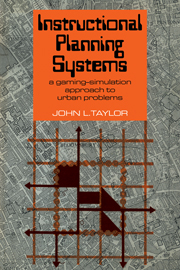Book contents
- Frontmatter
- Contents
- List of figures, tables and forms
- Acknowledgements
- 1 Point of departure
- 2 The basis for discussion
- 3 The genesis of an approach
- 4 Selected planning developments
- 5 Impact, pitfalls and pay-offs
- 6 A gaming-simulation rationale
- 7 Simulation in practice
- 8 The way ahead
- Appendices
- Bibliography
- Index
- Frontmatter
- Contents
- List of figures, tables and forms
- Acknowledgements
- 1 Point of departure
- 2 The basis for discussion
- 3 The genesis of an approach
- 4 Selected planning developments
- 5 Impact, pitfalls and pay-offs
- 6 A gaming-simulation rationale
- 7 Simulation in practice
- 8 The way ahead
- Appendices
- Bibliography
- Index
Summary
This work aims to record the development and relevance of a new simulation approach to the study of the urban development process at university level. Before examining gaming-simulation, the instructional technique which is the core of this approach, an attempt is made to put this new aspect of educational technology into some overall perspective. First, this is done with reference to the dynamics of the general educational situation and second, it is attempted with regard to the evolving state of education for planning. Then the role of gaming-simulation models, as a major element in certain instructional simulation systems, is tentatively outlined. Finally, after posing some of the questions which represent the starting point of this study the intentions and methods of approach are summarized.
THE EDUCATIONAL CONTEXT
How can university education be related to a rapidly changing world? What can the new educational technologies offer in meeting today's problems and tomorrow's needs? Where can the performance of higher education be improved?
This type of question, and many others are, quite rightly, often being presented by educators in search of change and improved performance. The concern here, however, is somewhat limited in that much must be left unsaid in order to take a closer look at the attitudes and climate which surround innovations and experiments in higher education. Obviously, there are many attitudes which inhibit the use and development of innovatory instructional systems at this level and some of these issues are now briefly considered.
- Type
- Chapter
- Information
- Instructional Planning SystemsA Gaming-Simulation Approach to Urban Problems, pp. 1 - 7Publisher: Cambridge University PressPrint publication year: 1971



